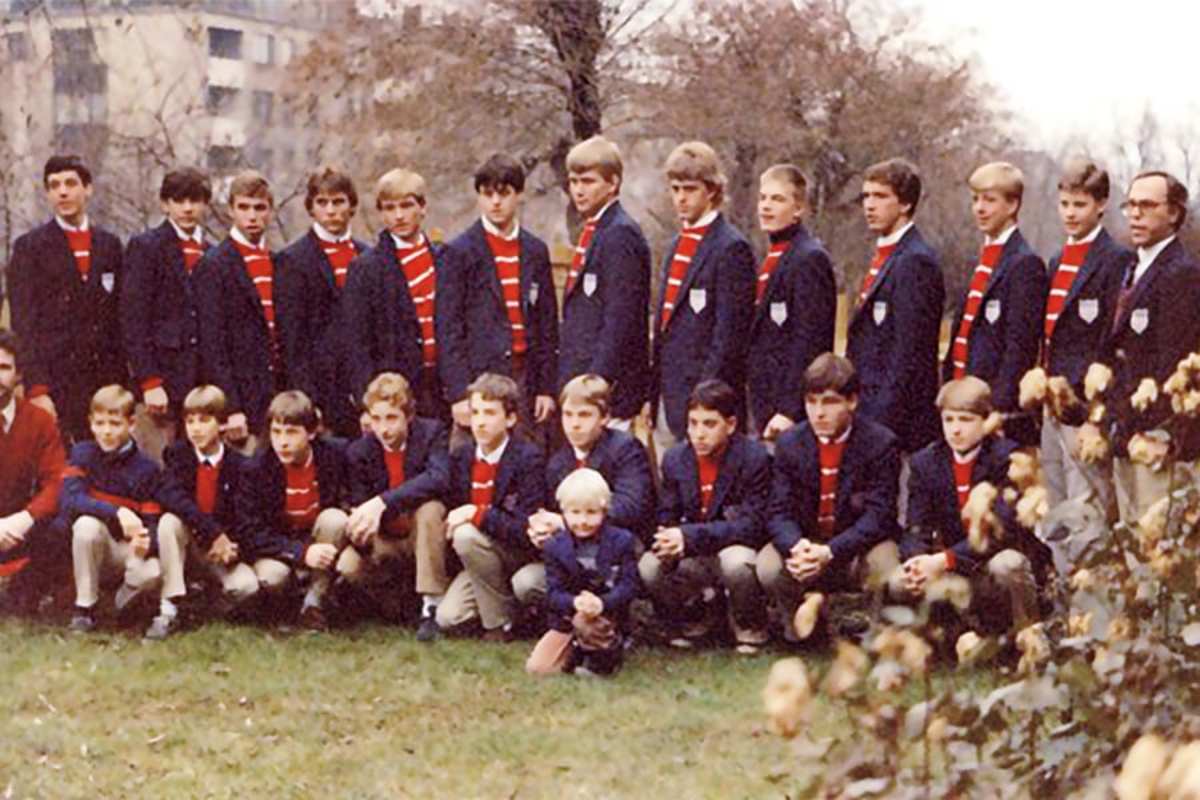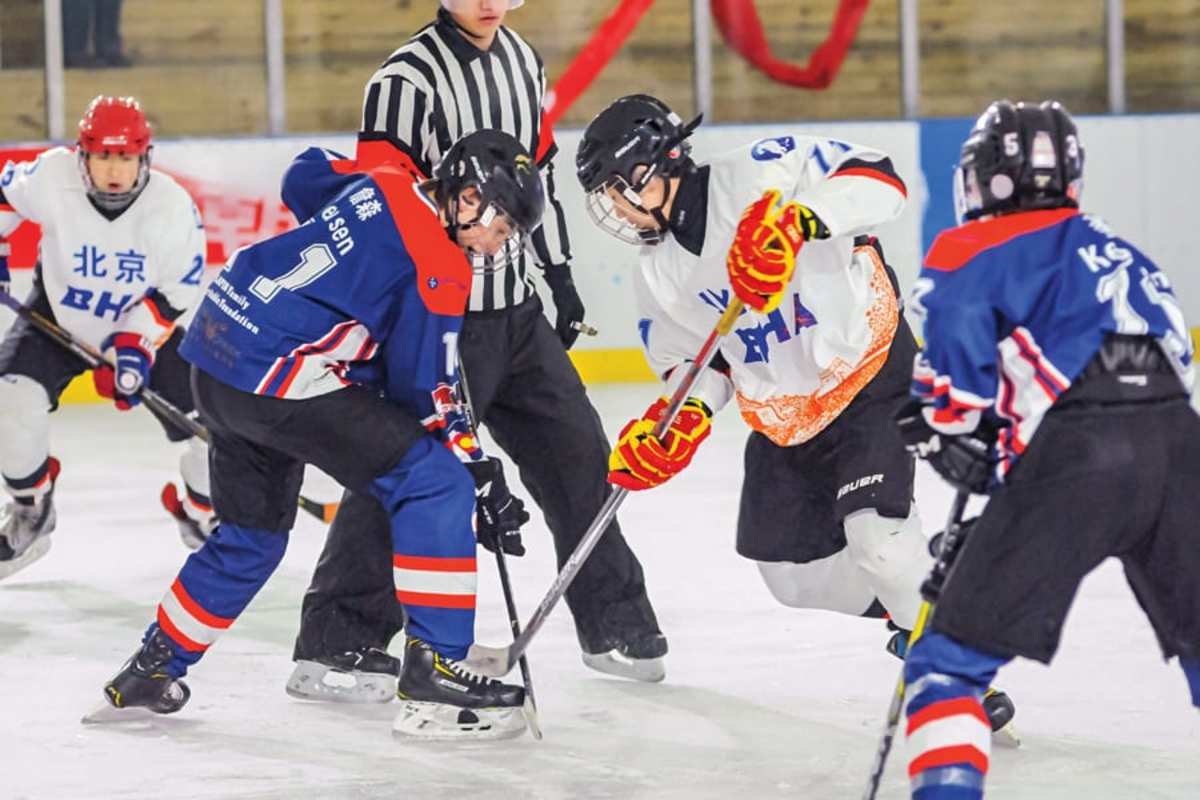By Jordan Horrobin
Standing on an ice sheet in a frigid courtyard in Leningrad, Soviet Union, 14-year-old Todd Hennessy paused for a moment to consider the whirlwind of his past 10 days. Tours of a Swedish warship and a Finnish castle. Tasting food he’d never heard of before. Five hockey games against players who didn’t speak his language. And now, after a train ride through the Iron Curtain, one final game on New Year’s Eve. It was 1985, not long removed from the Miracle on Ice, and Hennessy wanted to win this game most of all.
The Soviets won handily, but that was beside the point. Hennessy and his teammates from Vail, Colo., had come to Europe to see, touch and taste a world that previously was unknown to them.
Theirs was the maiden voyage for the Vail International Hockey program, a triennial trip for high-schoolers that still runs today, pairing hockey with world history to create the experience of a lifetime. “It’s a whole different perspective,” Hennessy said. “When you’re playing against someone that’s (thousands of) miles away in a normal situation, it kind of makes the world really, really small really, really fast.”

The story of VIH can’t be told without founding president Merv Lapin, a South Carolina native who didn’t learn to skate until attending college in the northeast. In the mid-1960s, Lapin moved to Vail for work and later helped jump-start the town’s hockey program. Growth was exponential, up to a certain age. “I noticed, when the kids became 13 and 14, they had to make a decision about whether they were going to become hockey players or skiers,” Lapin said. “So to make the hockey program more attractive, I started a program called the Vail International Hockey Club.”
Vail is a skier’s paradise, first and foremost. In 2018, the Vail Ski Resort ranked fifth on Forbes’ list of the best ski resorts in North America. So, yes, it was going to take something special to compete with that.
Lapin started with a spring tournament for high-schoolers, drawing teams from several countries (including China, Sweden and Germany) as well as domestically. He upped the ante a few years later, in 1985, taking Hennessy and about 30 others on a two-and-a-half-week hockey caravan through Western Europe.
The previous summer, Lapin had gone overseas to schedule games for the VIH team. But it was difficult to convince other clubs that his players were small-town amateurs, not some U.S. super-team. The Europeans figured only an elite squad would travel all that way. “They didn’t want to take the chance of losing,” Lapin said. “Subsequently, what happened is that they realized I wasn’t lying.”
Tickets were sold for some games, including the one in Leningrad that was marketed as “Team USA vs. Soviet Union.” In Finland, legend has it, a young Teemu Selanne was on the junior national team that dusted the Colorado kids 25-0 (“We did not cross the center line but once,” Hennessy recalled. “They were just that good.”). A few years later, on VIH’s inaugural trip to China, they sold out 10,000-seat arenas and garnered coverage on TV and in the national newspaper, the China Daily. Eventually, teams understood. This was just a group of regular Americans who wanted to learn about the world and play a little hockey in the process. And learn about the world they did.
Staying in austere hotels with faulty elevators while stomaching borscht soup in Russia or starfish on a stick in China gave the kids from Vail – a predominantly white and mid-to-upper-middle class mountain town – a new perspective on life. “Really, we lived in very much a bubble,” said Eric Eves, a former VIH player.
Eves’ bubble burst as a 13-year-old in 1993 on a trip to China. It was his first time outside the U.S., and, like many VIH alumni, the travel bug bit him instantly. He later attended a VIH trip to Europe, studied abroad in high school and college, and has since travelled to 45 countries. “We have kids that have worked all over the world now,” Lapin said. “Because they’ve learned that there’s no barrier to what you can do.”
As times change, there are fewer barriers for the VIH program. Players now regularly visit the homes of their foreign competitors, or at least spend some time with them off the ice. It’s an additional layer of the experience that at one time wasn’t possible – logistically, linguistically and, in some instances, politically.
Now, VIH wants to stretch its possibilities further.

Eves, who succeeded Lapin as director of VIH, hopes to turn the program into something reciprocal, with overseas clubs coming to Colorado to play while learning about American culture. It already started this past summer with a couple Chinese teams. Another one is on the way this winter, and there’s a Swedish team looking into a future trip, too. “If you can do that, that’s when you really have something,” Eves said. “That’s when you really see relationships grow that become impactful to society and culture and communities.”
Surely, most kids in the VIH program aren’t thinking about their societal impact. That’s why hockey is imperative in this process. Hockey is common ground for teens from Vail to Prague to Helsinki to Shanghai. It requires no translation from language to language, country to country, culture to culture.
The VIH program intends to show kids the world, and it does. But it wouldn’t be possible without hockey. “That’s kind of the common thread, the common language that we use to get (kids) to look at other things and consider other cultures and ways of thinking,” Eves said. “I think that just allows them to get excited about it, jump in and go have that lifelong memory.”
This story originally appeared in The Hockey News 2020 Trade Deadline Preview. Want more in-depth features, analysis and opinions delivered right to your mailbox? Subscribe to The Hockey News magazine.


